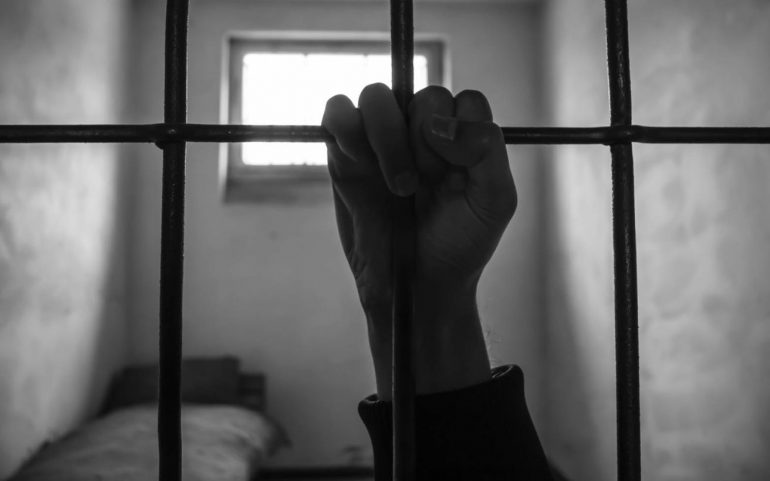Early in the evening of Sunday, February 20, 1949, the foreign correspondents in the capital and the journalists of the Athenian newspapers were notified by the Commander of the General Security of Athens, Nikolaos Tsaousis, to hurry to meet him because he had something important to show them. A little while later, the representatives of the press were shocked in front of one corpse. It belonged to a 53-year-old man and he wore only his underwear and socks.
"It's about him Dimitrios Papariga, member of the Politburo of the Communist Party. He has been detained for eight months. He was hanged from 18:30 to 19:00 this afternoon in custody with the string of his pajamas, which he had tied to the railing of the cell. Even the necropsy, as Professor Georgiadis can confirm, shows that this is a classic form of suicide indoors. No note or letter was found, "he explained, in an attempt to disprove any other version that might have been heard.
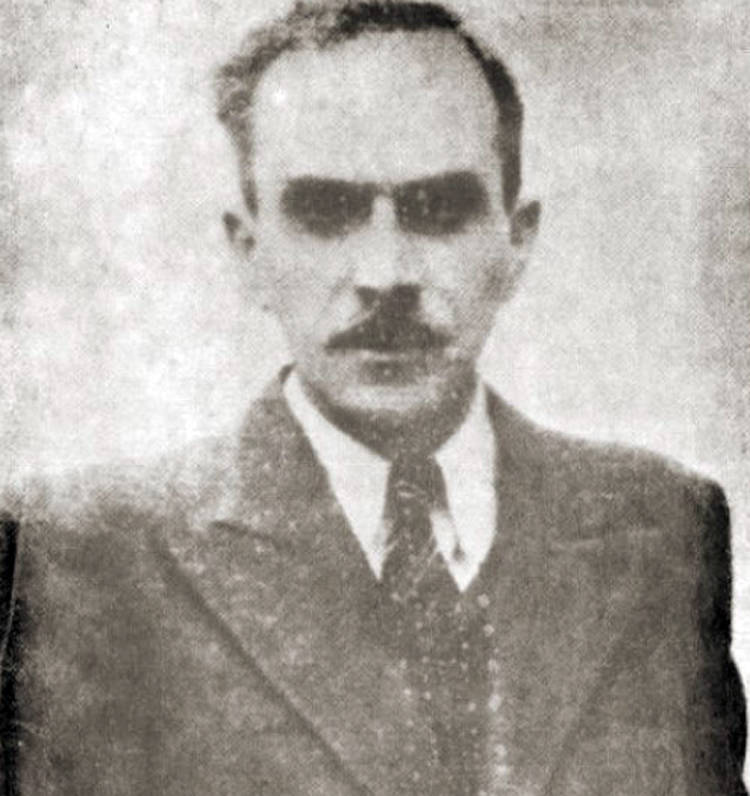
At times, many inmates had "committed suicide" by allegedly putting a makeshift noose around their necks or "choosing" to jump out of open windows or rooftops to atone. Another common way to exterminate dissidents was to subject them to torture they could not bear and then to report that they had died from opposition or other pathological causes.
In this case, according to the official scenario of the Authorities, on the morning of Sunday, February 20, 1949, the "suicide bomber" woke up in a good mood in the General Security cell.
At 10:00 a.m. in fact, when the director of the Athens Police Angel Evert (father of the later president of New Democracy, Miltiadis Evert) carried out a surprise inspection, and Paparigas appeared before him. "Do you have any complaints?" the police director asked him. The two have known each other for a long time as the leading member of the K.K.E. in addition to the rich trade union activity he had developed, he also had in his assets recorded deportations and escapes.
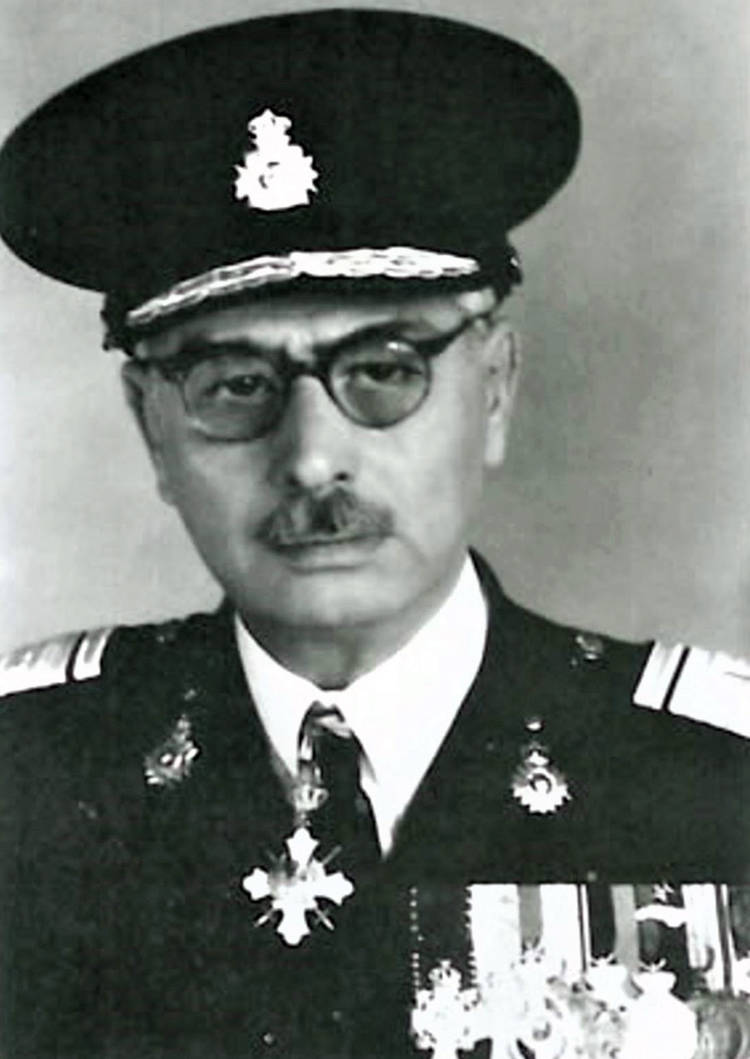
"Absolutely no complaints. I have everything I ask for. "All I would like is to shave today," the detainee reportedly replied. According to the narration of the authorities, which was reflected in the majority of the bourgeois press of the time, the director of the Police "allowed the barber of the General Security to shave the detainee, but Paparrigas did not call him" ("Kathimerini" newspaper, 22.2.1949. XNUMX). At noon the prisoner had lunch and then lay down on his bed.
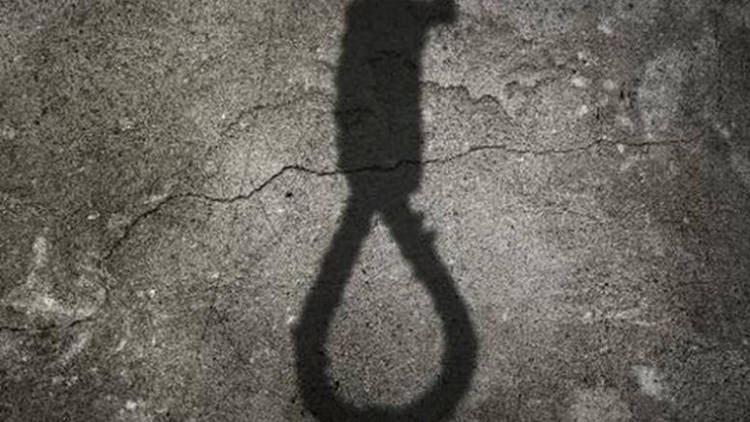
The cells were inspected every quarter of an hour. After the check at 18:00, the K.K.E. asked the policeman on duty at the time to let him go to the toilet. He did go and then go back to his cell and they locked him up again.
When a few minutes later the target looked again through the small hole of the heavy metal door, "he realized that Paparrigas had been hanged with a string on the window. The commander of the General Security, Mr. Tsaousis, was immediately notified and soon after, the director of the Athens Police, Mr. Evert (who had previously carried out the surprise inspection), and the Minister of Public Affairs, Mr. Tsaousis, arrived one after the other. After the Deputy Minister Mr. Panopoulos, the Military Commander of Athens Lieutenant General Papageorgiou, the Commissioner of the Extraordinary Military Court Mr. Stasinopoulos, the Chief of the Athens Prosecutor's Office Mr. Mandrapilias, the Honorary Professor of Forensic Medicine and Mr. Georgikos at the University of Mr. Katsas to conduct an autopsy and necropsy ", as" Kathimerini "reports in the same paper.
The corpse wore only his underwear and socks because according to the reports “his clothes were found hanging on the wall of the detention center. His pajamas were found on the campaign bed. Paparrigas had pulled the string from his pajama pants and used it to make the loop with which he had surrounded his neck. He tied the other end of the string to the knob of the window, then let his body fall to be hanged. The corpse hung at a minimum height from the floor with the legs slightly bent inwards. "Death had just occurred a few hours ago."
But one more information was leaked. Six days before he died, Paparigas allegedly wrote under the plate given to him "to warn Moscow to start a war against the executions that will begin."
We should not forget that we are still in the period of the Civil War that has officially broken out since 1946 between the government army and the guerrilla forces of the Communist Party, the Greek Democratic Army, with the hostilities ending about half a year later. Many communists even believed in vain that Moscow and personally the general secretary of the Central Committee of the Communist Party of the Soviet Union, Joseph Stalin, would help them in their struggle.
But the Soviet leader had secretly divided southeastern Europe into spheres of influence with British Prime Minister Winston Churchill since 1944, something no one knew yet. Under this agreement, the British had a say in what was happening in Greece at a rate of 90% (which they later "transferred" to the USA) against 10% of the USSR. Stalin kept his word regarding Greece and was not involved in the slightest in the civil war. Paparigas, however, who had contacts with Moscow for years, believed that Soviet comrades would help.
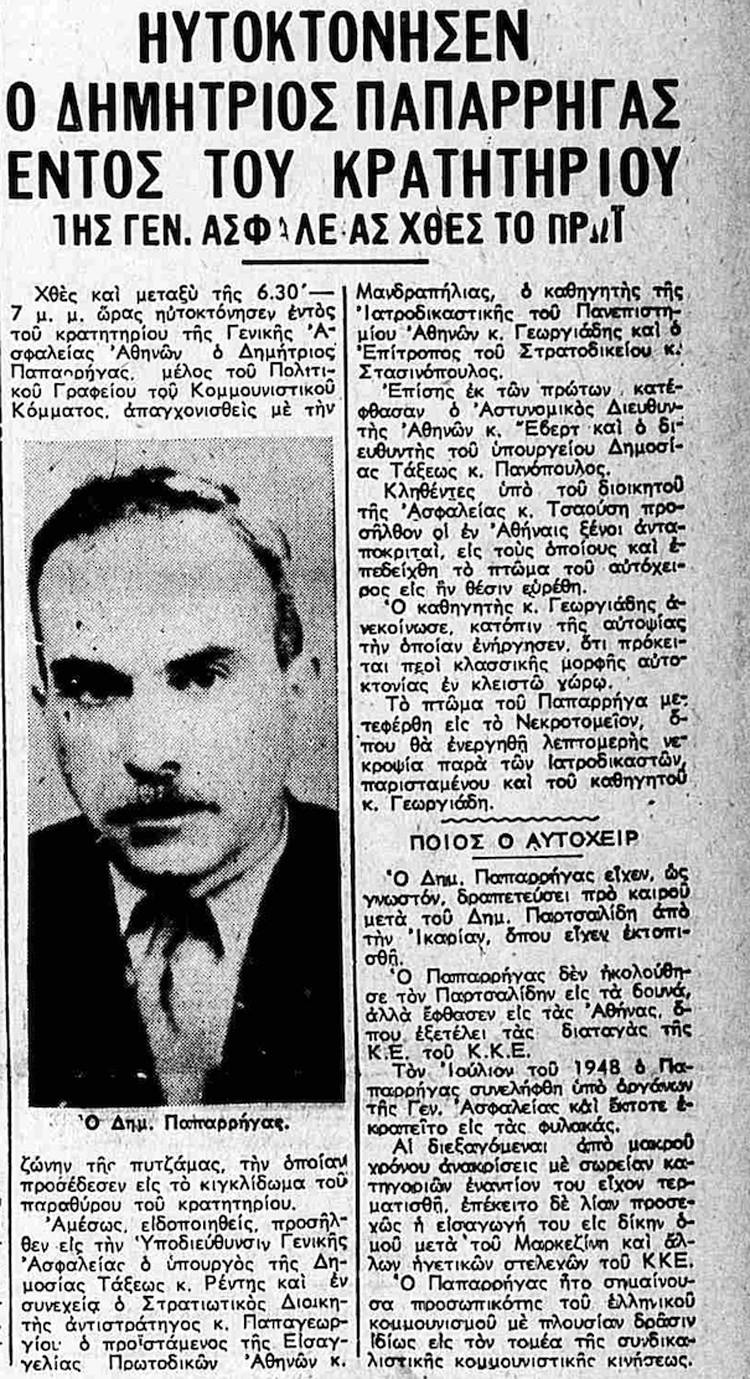
One of the first to be notified of Paparigas' death was his 32-year-old wife Vasiliki, of the genus Karantoni, who went to the General Security, unable to believe the harm he had done to her. In the past she had assisted in his struggle KKE but he was then forced to sign a "declaration of repentance and renunciation of communism" in order to be able to circulate freely. The fruit of the love between the couple was the then five-year-old Thanasis Paparigas who, growing up, will follow journalism and in his turn will marry Alexandra Drossou.
His wife was to become the first woman to lead a parliamentary party and the first woman general secretary of the K.K.E. We are of course referring to Ms. Aleka Papariga, the longest-serving political leader of the post-colonial era as he completed 22 consecutive years in this position (1991 - 2013).
In the ranks of the K.K.E. However, no one believed that Mitsos Paparigas committed suicide three days before his trial by the Athens military court. According to the newspaper "Ethnikos Kiryx" of the time, "these days he was to be transferred to the Averof prison (s.s. was located at the place where the Areios Pagos has been erected today, on Alexandra Avenue) as long as he and those after co-accused of collaborating with V. Markezinis, Kornilios Nikolaidis, A. Chainoglou, E. Plakantonakis, Stella Plakantonakis, Univ. Karagitzis or Simos, A. Ioannidis, N. Moutenidis, E. Lygiros, Klio Ioannidis, Martha Stamati, L. Tiakas, I. Anagnostopoulos and S. Plakantonakis, had been referred to the Extraordinary Military Court ".
Explaining the "suicide", the author states that "it seems that he did not have the courage to face the overwhelming accusations with which he was charged, but he did not want to deny them before the Military Court, fearing the fate of his perpetrators. It is also said that heavy expressions were exchanged between him and V. Markezinis, as at the moment, Paparrigas suspected that Markezinis had betrayed his hideout. In fact, in a momentary meeting of theirs, in the General Security prisons, Markezinis was heard saying to Paparrigas: Find out, I am not a traitor… ".
The newspaper "Estia" of February 22, 1949, will move in the same direction. Either because he was disappointed with the information he had learned about the heated controversy within the Communist Party, or because he wanted to prevent his public trial and the possible revelation of the communist secrets that he knew of, , self-manipulating ".
He concludes: "In any case, we must keep in mind that the world communist movement and its allies will benefit as much as they can from this suicide, in order to try to discredit Greece. For this reason, all foreign journalists present here should be called immediately to learn all the details of the suicide and to find out from their own perception the circumstances under which it took place. "Greece has nothing to fear and nothing to hide."
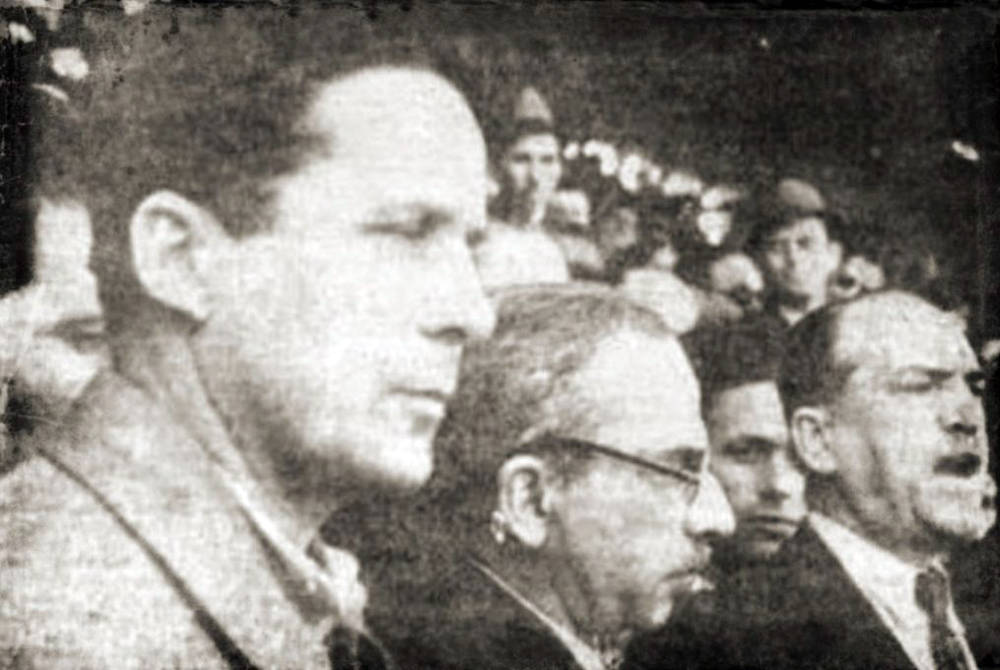
The hanged man had given his whole life to the party. He was born in 1896 in Volos and grew up in poverty with his four brothers. From a very early age he was tested in bio-wrestling after he went to the school of the time until the second grade and then he started working as a blacksmith. He was only 14 years old and had already begun to possess the element of class consciousness. In 1921 he was sent to the Asia Minor front, a fact that made him hate militarism and now speak openly about the sufferings of "international imperialism and its local subjects." In October 1922 he became a member of the K.K.E. His party organizes the organization of the Association of Veterans of Magnesia and is immediately elected secretary. A year later he was imprisoned and exiled while in 1924 he led the general general strike in Volos, highlighting his organizational skills. The workers trust him and make him secretary of the city's Labor Center. At the 3rd conference of the K.K.E. (1927) was elected a member of the Central Committee and in the 4th (1928) a member of the Politburo. In 1930 he was imprisoned in the Indzedin fortress of Chania.
As soon as he was released from prison, however, he was re-arrested and in 1931 he escaped from Syggrou prison and escaped abroad. He was arrested again in 1936 by the Metaxa regime and for the next eight years he was imprisoned and exiled to Corfu, Kimolos, Akronafplia and Haidari, from which he escaped with the help of the Athens Party Organization to return to illegality. After the Occupation, he took the lead in the struggle of the unions and would be elected general secretary of the General Confederation of Greek Workers. It will be caught by the authorities once again in 1948. It will be the last…
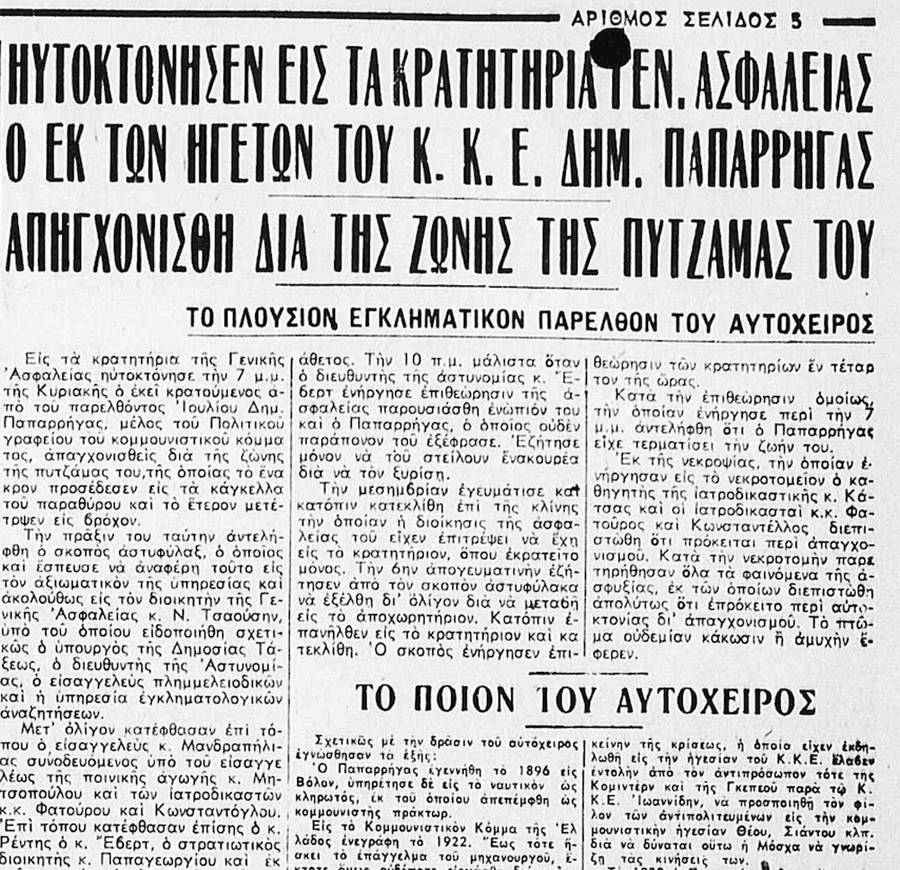
The Central Committee of the K.K.E. announced the loss of the communist trade unionist and secretary of the G.S.E.E. on February 21, 1949 with an announcement published in the newspaper of the Democratic Army of Greece "Towards Victory". He states: "It is with great sadness that the Central Committee and the Central Audit Committee of the KKE announce that on February 20, in the basements of the General Security of Athens, Mitsos Paparigas, General Secretary of GSEE, member of the Central Committee of the Hellenic Central Committee, was assassinated. one of the old members of our party. In the person of Mitsos Paparigas, the working class and the people of Greece are losing one of the most pioneering fighters, one of the highest leaders in our People's Liberation Struggle.
The assassination of our unforgettable comrade Mitsos Paparigas was organized by the American-British imperialists and the monarcho-fascist agents with the personal participation of Rentis (s.s. Konstantinos Rentis was then Minister of Public Order). They thought that this would bend our people. But the heinous crime further undermines the will of the workers to crush the enemy. The life and the struggles of Mitsos Paparigas will enlighten them and inspire them until the final victory (…) ".
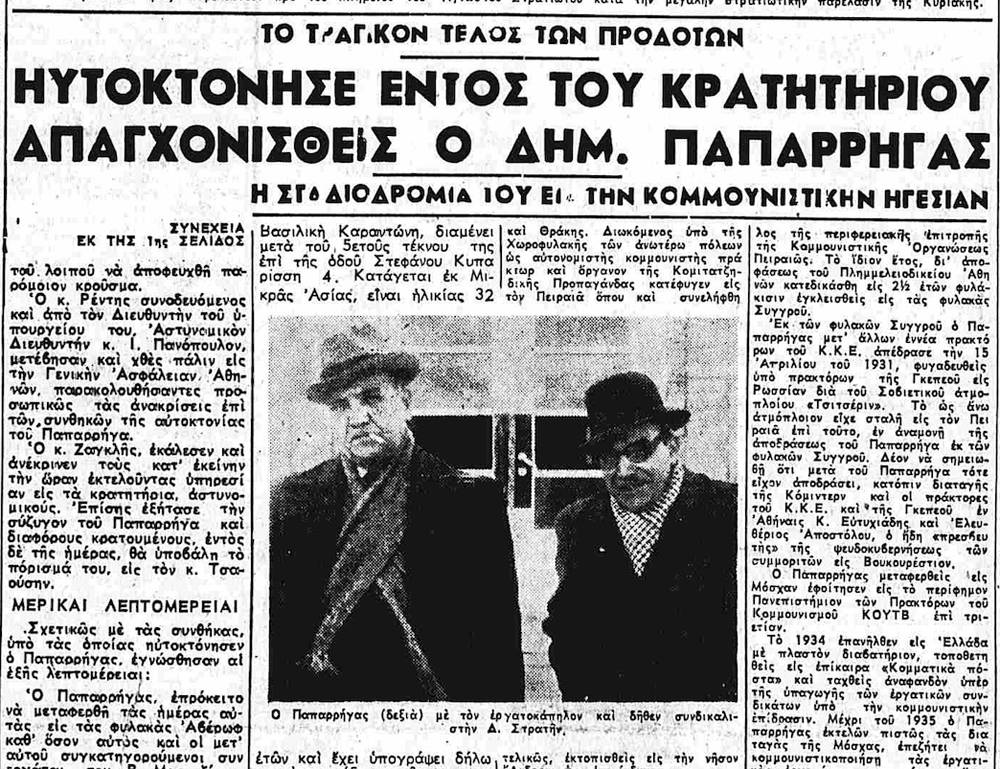
Also worth mentioning is the testimony of National Resistance member Margarita Kotsaki, who spent a total of 16 years in prison and was exiled for another 11 years for her communist activities, as her cell was right next to that of Mitsos Paparigas when he died. In her book "A life full of struggles" (Modern Edition publications) she mentions:
"Suddenly, on the morning of February 20, 1949, I heard the voice of the guard, who was counting in every cell:" Paparigas is furious! " He was running to the police station, and I took the opportunity and asked the girl who was imprisoned in the opposite cell: "What will he say, he was furious?" And she answered me: "He was hanged, it means he was hanged." I literally froze.
From that moment a great movement began. They were coming and going to see him hanged. The door of my cell did not touch the concrete floor and left a crack. I was lying on my stomach and I could see the legs coming and going. I did not know what to do. I asked them to open the toilet for me, but they did not open it for me. They did not open to anyone all day. Tears welled up in my eyes.
I wept for the man, the fighter, the devoted to the working class, who was murdered in such an inhuman way. In the afternoon and evening I heard new voices: "Journalists are coming." Again I lay down and saw shoes different from those of the police. Who knows, or rather we know, what kind of journalists they called. (And now I wonder: None of them was found, after so many years to say what he saw? It seems that these journalists came from newspapers praising the Right, and hated the communists to death…) At midnight I heard footsteps again as if dragging something heavy. I lay down again, and saw something heavy being dragged on a blanket. Understood. It was the honored body of comrade Paparigas.
The next morning they opened for us. Then I saw in the back of the corridor a pile of clothes, covered with a gray raincoat. I asked a policeman who did us a favor: "But where did he find the rope inside the cell and hang himself?" He replied: "Oh, with the string of his pajamas. "But," I tell him, "the window of the cell is high, how could he reach and pass the string through his irons?" "Well," he tells me, "because he was old we had given him a stool to sit on: He got on it, and passed the string." The lie was very thick, but what did I expect? To tell me the truth?
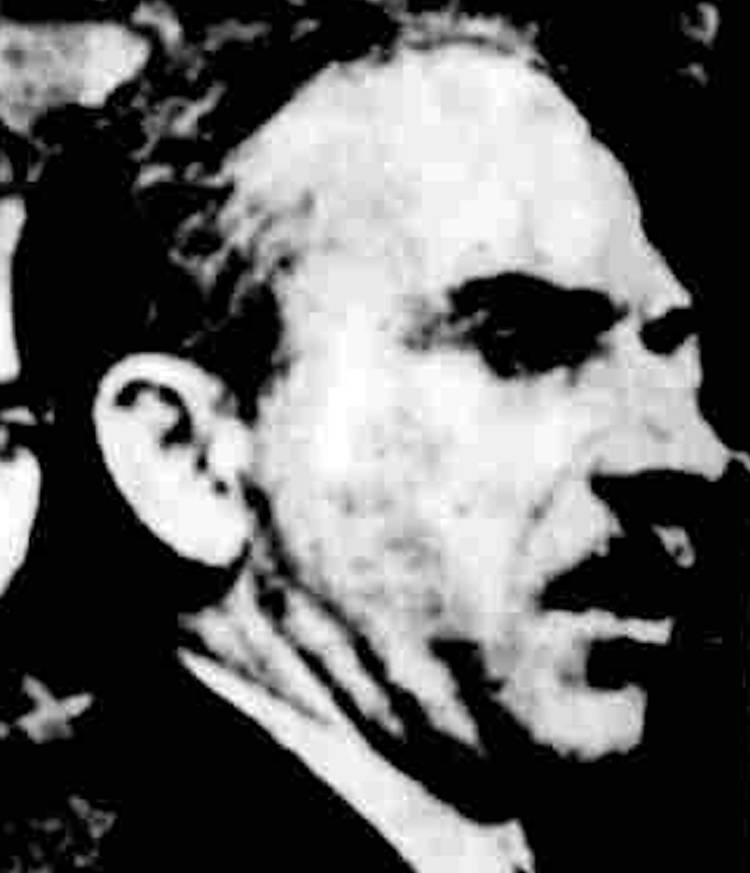
The other day I heard a woman crying. I understood, it was the cries of Basel, the wife of the murdered fighter. The night Paparigas was hanged, I listened all night to the delusions and groans of the fighter Tsamoutalidis. This fighter was thrown out of the window, they did not hang him like Paparigas ". What has not been clarified is how they "committed suicide" Paparigas or how his inmate in the cell next to Margarita Kotsaki did not realize that the authorities directed his hanging. Nothing was heard when they went to pass the noose around his neck? Didn't he understand when his cell would be opened for Security men to enter? There is, however, one more parameter as to the way in which the member of the Left died.
The newspaper "Rizospastis" in the issue of December 16, 1979 reports characteristically: "As it was revealed a few years later, in the post-civil war period, Mitsos Paparigas was killed slowly and systematically, after his executioners took care to put doses of some kind of poison in his food Until they finish it.
* George Sarris is a journalist - member of ESIEA, honored by the President of the Republic with the Ath. Botsis Award for the objective and complete presentation of historical political issues.
